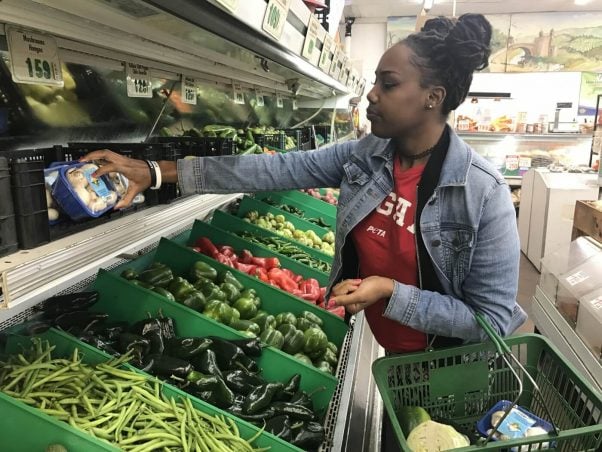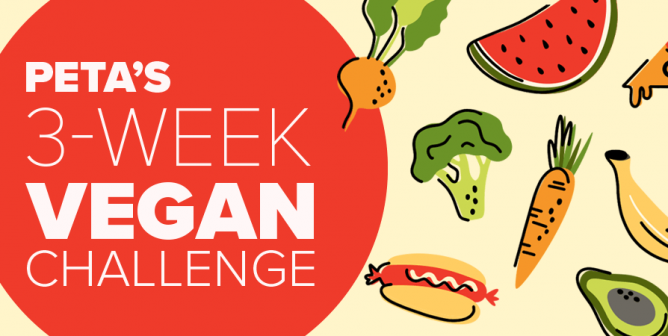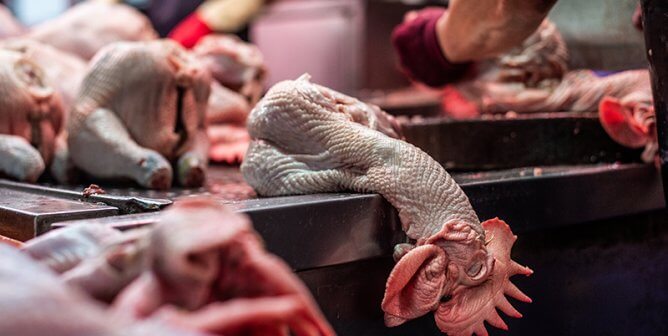Eating Plant-Based Foods Makes People Less Vulnerable in Pandemics
A growing number of studies are drawing the connection between our food system and global pandemics such as the COVID-19 crisis. In the U.S., more than 99% of animal-derived foods come from factory farms, where animals are kept in cramped, filthy conditions, leaving them susceptible to dangerous pathogens that can spread among them and to humans.1 Animal agriculture has been the source of countless outbreaks of dangerous zoonotic diseases (those that can be transmitted to humans from other animals), including avian and swine flu strains that have killed hundreds of thousands in recent years.2 Both humans and animals suffer as a result of these outbreaks. Eating meat and other animal-derived foods also harms human health, making people more likely to suffer from metabolic syndrome and other chronic conditions, which increases their susceptibility to infectious diseases.

What Is a Poor Diet?
Having a poor diet typically refers to consuming either insufficient or excess nutrients. This could mean not eating enough fruit or vegetables or consuming too much cholesterol, fat, or sugar. Malnutrition is an issue all over the world, including in the U.S. In fact, a study found that by 2016, having a poor diet was the leading cause of ill health in this country and was responsible for more than half a million deaths each year.3
How Does Eating Meat Harm Human Health?
Experts agree that in order to meet our nutritional requirements, we must eat enough fruits and vegetables. Unfortunately, fewer than one in 10 U.S. adults and adolescents do so.4 In fact, only 8% of a typical American’s caloric intake is derived from fruits and vegetables—in comparison, almost 30% comes from animal-derived foods.5 This is problematic, as meat, dairy, and eggs are high in cholesterol and saturated fat, which can accumulate in the body and cause a variety of health issues, including heart disease, strokes, obesity, diabetes, cancer, and even deficits in brain function. A major study published in the American Journal of Epidemiology, for example, found that among the 29,000 participants, those who ate the most meat and dairy were at the greatest risk for heart disease.6 Several studies have found evidence that a plant-based diet high in antioxidants, micronutrients, nitrate, and fiber and low in saturated and trans fats can help prevent heart failure.7 Others have concluded that eating plant-based foods can help lower body mass index, blood pressure, and cholesterol levels as well as reducing the amount of treatment needed for chronic diseases.8
Despite this growing evidence that vegan eating is the healthiest option, the majority of Americans continue to choose animal-derived foods over fruits, vegetables, and other plant-based options. As a result, fewer than one in five American adults is metabolically healthy and most suffer from a slew of diet-related diseases.9 In this country, 39.8% of adults and 18.5% of children are obese,10 and obesity-related types of cancer are growing among young adults.11 More than 100 million Americans suffer from diabetes or prediabetes, and one in three children born after 2000 is expected to develop type 2 diabetes.12 There are 122 million Americans suffering from heart disease, and over 840,000 people die of it each year.13
The negative impacts on human health don’t stop there—eating animal “products” can also result in an increased infection risk during a global pandemic.
What Difference Does a Poor Diet Make During a Pandemic?
As the COVID-19 pandemic took hold, it became common knowledge that elderly and immunocompromised people are most at risk of dying from the disease. However, very little light has been shed on the fact that having a diet low in nutrients can cause people to become immunocompromised. Metabolic syndrome—in which a person has a combination of excess abdominal fat, hypertension, high blood sugar, high triglycerides, and high cholesterol—can increase overall inflammation and stifle the immune system’s ability to fight infection.14 This is especially dangerous in conjunction with COVID-19, as the disease also increases inflammation in the body and can cause a total shutdown of organs,15 so individuals with underlying inflammatory diseases are more likely to suffer from severe symptoms. For example, a study found that 60% of people aged 18 to 49 who were hospitalized with the novel coronavirus were obese and that obesity was the biggest risk factor in those aged 50 to 64. For those over 65, high blood pressure was the biggest risk factor.16 Because of our country’s high rate of consumption of animal-derived foods and inadequate intake of plant-based ones, the majority of Americans suffer from some form of metabolic syndrome and are therefore at greater risk of experiencing severe symptoms or dying during a pandemic.
Research has also found that the risks associated with not eating enough plant-based foods disproportionately affect African Americans. Communities of color are often faced with food oppression and don’t have access to fresh and unprocessed foods like fruits and vegetables. This forces them to rely on fast food or overly processed products, which typically contain mostly animal-derived foods, increasing their risk for chronic diseases. This may be one reason why a disproportionate percentage of African Americans are dying of COVID-19.17 Throughout the country, the rate of Black fatalities is an estimated 2.4 times higher than that of white Americans and 2.2 times higher than that of Asians and Latinos.18 The Centers for Disease Control and Prevention (CDC) found that in its study catchment area, African Americans made up 18% of the population but accounted for 33% of COVID-19 hospitalizations.19

PETA’s successful campaigns urging fast-food restaurants to offer more vegan menu items have increased the availability of healthier options for many living in food deserts across the U.S. Chains like Del Taco, Carl’s Jr., and Dunkin’, for example, sell plant-based meat products from Beyond Meat, and choosing these over red meat can be beneficial for cardiovascular health.20
What You Can Do to Improve Health Outcomes
We can improve our diet and thereby lower our risk of suffering from chronic and infectious diseases by increasing our consumption of plant-based foods. Eating vegan foods can support a strong immune system, help maintain a healthy weight, and lower blood pressure and cholesterol, decreasing our likelihood of experiencing severe symptoms or dying from infectious diseases like COVID-19. When businesses choose to offer vegan options, they’re helping not only to spare animals’ lives but also to improve the health of their customers and the wider community.
References
1World Health Organization, Food and Agriculture Organization of the United Nations, World Organisation for Animal Health, and Health Council of the Netherlands, “Report of the WHO/FAO/OIE Joint Consultation on Emerging Zoonotic Diseases,” 3–5 May 2004.
2M. Peiris and H.-L. Yen, “Animal and Human Influenzas,” Revue scientifique et technique, 33.2 (2014): 539-553.
3The US Burden of Disease Collaborators, “The State of US Health, 1990–2016: Burden of Diseases, Injuries, and Risk Factors Among US States,” JAMA, 319.14 (2018): 1444-1472.
4CDC National Center for Chronic Disease Prevention and Health Promotion, “Chronic Disease,” 14 Apr. 2020.
5United States Department of Agriculture Economic Research Service, “A Look at Calorie Sources in the American Diet,” 5 Dec. 2016.
6Linda E. Kelemen, et al., “Associations of Dietary Protein With Disease and Mortality in a Prospective Study of Postmenopausal Women,” American Journal of Epidemiology, 161.3 (2005): 239-249.
7Conor P. Kerley, “A Review of Plant-Based Diets to Prevent and Treat Heart Failure,” Cardiac Failure Review, 4.1 (2018): 54-61.
8Philip J. Tuso, et al., “Nutritional Update for Physicians: Plant-Based Diets,” The Permanente Journal, 17.2 (2013): 61-66.
9Jane Brody, “How Poor Diet Contributes to Coronavirus Risk,” The New York Times, 20 Apr. 2020.
10H. Waters and M. Graf, “America’s Obesity Crisis: The Health and Economic Costs of Excess Weight,” Oct. 2018.
11Hyuna Sung, et al., “Emerging Cancer Trends Among Young Adults in the USA: Analysis of a Population-Based Cancer Registry,” The Lancet Public Health, 4.3 (2019): e137-e147.
12Jerold Mande, et al., “Report of the 50th Anniversary of the White House Conference on Food, Nutrition, and Health: Honoring the Past, Taking Actions for Our Future,” Mar. 2020.
13Emelia J. Benjamin, et al., “Heart Disease and Stroke Statistics—2019 Update: A Report From the American Heart Association,” Circulation, 139 (2019): e56-e528.
14Brody.
15Miriam Merad and Jerome C. Martin, “Pathological Inflammation in Patients With COVID-19: A Key Role for Monocytes and Macrophages,” Nature Reviews Immunology, 20 (2020): 355-362.
16Shikha Garg, et al., “Hospitalization Rates and Characteristics of Patients Hospitalized With Laboratory-Confirmed Coronavirus Disease 2019—COVID-NET, 14 States, March 1–30, 2020,” Morbidity and Mortality Weekly Report, 69.15 (2020): 458-464.
17Nadra Nittle, “People of Color Are at Greater Risk of COVID-19. Systemic Racism in the Food System Plays a Role,” Civil Eats, 5 May 2020.
18APM Research Lab, “The Color of Coronavirus: COVID-19 Deaths by Race and Ethnicity in the U.S.,” 10 June 2020.
19Garg et al.
20Stanford Medicine, “Plant-Based ‘Meats’ Improve Some Cardiovascular Risk Factors Compared With Red Meat,” ScienceDaily, 11 Aug. 2020.





